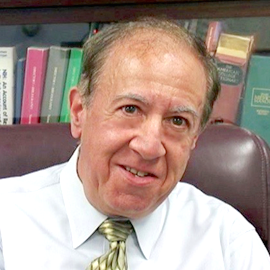Can Synthetic Biology Address Climate Change?
Conference to explore prospects
Synthetic biology – engineering organisms to perform specific tasks – is well known for making strides in areas like health care, but a workshop on campus next month aims to explore its potential role in addressing another area of pressing concern: climate change.
“The Role of Synthetic Biology in Atmospheric Greenhouse Gas Reduction: Prospects and Challenges” will draw some of the nation’s leaders in synthetic biology, engineering, atmospheric science, law, ethics and policy to campus on Dec. 3-4. The event is funded by the Alfred P. Sloan Foundation and hosted by the College of Engineering and the Graduate Program in Bioinformatics and Systems Biology.

The workshop is being organized by Metcalf Professor of Science and Engineering Charles DeLisi (BME, Physics), widely regarded as the father of the Human Genome Project and an early pioneer in computational biology. He founded the Bioinformatics Program at BU, the first such program in the nation. Michael MacCracken, chief scientist for climate change programs at the Climate Institute in Washington, DC, and Aristidis Patrinos, chief scientist at the Novim Group, are co-organizers.
“There is no magic bullet for meeting the climate change challenge,” said DeLisi, who also served as dean of the College of Engineering from 1990 to 2000. “It will require a full battery of approaches including greenhouse gas emission control, alternative energy sources, adaptation, and the development of technologies for removing atmospheric greenhouse gases. The last of these is important for multiple reasons, including a centuries-long rate of clearance of CO2 and some other trace gases from the atmosphere by natural processes.
“Although a number of removal strategies are being developed, an approach that has received almost no attention is the use of a very powerful and relatively recent technology — synthetic and systems biology — to modulate the carbon cycle by augmenting land management approaches,” DeLisi added. “The workshop will explore the scientific, technical, ethical and legal challenges of such an approach, its potential impact and cost, and expected economic returns from anticipated discoveries of new drugs and increased agricultural productivity.”
The workshop is expected to attract an interdisciplinary group of leaders with a stake in the intersection of synthetic biology and greenhouse gas reduction. Among the presenters will be George Church of Harvard University, Adam Arkin of Lawrence Berkeley National Laboratory, Steve Hamburg of the Environmental Defense Fund, and David Resnik of the National Institutes of Health. Other participants will include Nobel Prize winners Professor Emeritus Sheldon Glashow (Physics, Mathematics) and Richard Roberts of New England Biolabs, and a diverse group of thought leaders in an array of fields.
The event will be held in the Agganis Arena Friends Lounge and will be streamed live.